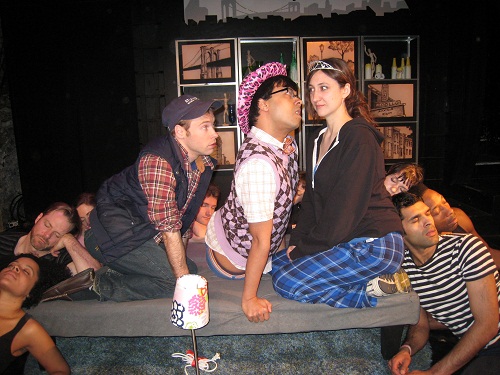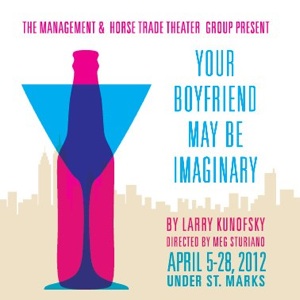While there’s nothing to indicate that Sondheim influenced Larry Kunfosky’s Your Boyfriend May Be Imaginary in any way (in fact, extensive interviews with Larry Kunofsky beforehand never once included references to The Man or the the musical I’m about to cite) we all have our own personal archives. To me, there was an undeniable Company element (albeit an updated one) which manifested early on and lingered for most of the play. Perhaps unintentionally Kunofsky has, in Your Boyfriend, offered up the city which Another Hundred People paid (somewhat contemptuous) homage to – the “city of strangers” with the people who “meet at parties through the friends of friends who they never know”. And as main character Marci spends the night living out the line: “I looked in vain”, another hundred people just got off of the train.
In other words – New York and its parties and crowds and social pecking order hasn’t really changed much in the 40 years since Sondheim wrote of the swarming masses of New Yorkers who gather and pretend to socialize when really they’re just desperately trying to be seen, and be seen being seen. Your Boyfriend tosses main character Marci (an absolutely perfect Darcy Fowler) into this muddle of humanity although (by her own affectation and admission) it’s the last club in which she’s interested in truly having membership. She’s only out on this buzzing Saturday night because it’s her six month anniversary with her boyfriend and (despite plans) he’s MIA. His lack of phone, real address and other oddities give her little choice but to brave a tenuous labyrinth of parties in order to seek out acquaintances who may or may not know where her “off-the-grid” boyfriend may be. However, since Marci herself is a bit off the grid no one quite believes that this relationship exists – even as one character, Beth, concedes “Her story is elaborate. Even if it’s fictional it’s layered … and that in and of itself is a feat.”
Clearly Marci’s not a party girl, so these parties are more hostile than hospitable to her skittish temperament. She tries to remain as invisible as possible (“I’m not here” is her mantra of the evening) … the idea is to just get what she needs and get out. In fact, she’s so out of her element that it hadn’t even occurred to her to dress for her destinations. She’s wearing what she slept in, which is what she wore the day before, and she has no compunction admitting that she hasn’t showered. This is just one of the quirks which sets Marci apart from this writhing mass of cell phones and hot music and cool eccentricity she continually encounters which hums and babbles and hugs and waves and clumps together and breaks apart but does little to actually connect on any level that matters.
“It’s kind of like Alice in Wonderland,” Kunofsky had said in his interview with me, “if Alice were an adult, had a boyfriend, couldn’t find him, and jumped into the Rabbit Hole that is all the parties that people are having in the Big City on a happening Saturday night.” And while there is a fish-out-0f-water element that parallels Alice’s there is also no denying that the “other”ness of Marci is an echo of what so many city-dwellers feel and have felt since … since they began admitting their feelings to their therapists. But not to their friends.

Your Boyfriend May Be Imaginary featuring Zach Evenson, Debargo Sanyal, & Darcy Fowler Photo credit Meg Sturiano
Marci is one main character – the other main character is not so much a person but The Crowd itself which surrounds her. This crowd of ubiquity babbles random things, snatches of which can be heard during scene changes, and it’s the random stuff that’s funny and inconsequential and yet somehow very important; because in this miasma of humanity where Marci is sifting and searching, these snatches of words are as valuable as anything else she will hear. In other words: not very valuable at all.
Sometimes bits of the crowd break off to interact with her, but for the most part The Crowd remains a solid mass of something she not only cannot penetrate but – more importantly – something she wishes to have no part in. While she’s present she’s certainly not included. Those giving the parties would have her believe otherwise; there’s the self-centered Cassandra who - surprised to see Marci – greets her with a “Marci! I’m sorry I haven’t called or seen you or kept in touch with you in any way. I’m so glad you’re here.” It’s like this everywhere she goes: she keeps being assured that she was invited … informally of course because really the process is so random. More of a “you know you’re always welcome, even though we actually haven’t talked to you in … what? Four years?” And another hundred people just got off of the train.
Cassandra (played by Risa Sarachan) is vain and self-centered, she preens and pouts and simultaneously demands your attention while dismissing you. She has nothing to offer Marci except a lamp which Marci then carries with her throughout the play. What seems like an odd and superfluous gesture is really a symbol of all the empty, unnecessary (and useless) pieces of comfort New Yorkers so often exchange – it’s an “OhMyGodI’mSoSorryYou’reGoingThroughThis” and a “LetMeKnowIfYouNeedAnything / WhatCanIDoToHelp?!?” empty token that, once offered, alleviates the giver of their guilt but is about as useful as … an unplugged bedside lamp in the streets of New York.
Marci, however, dutifully carries this pointless gift which serves partly as a talisman, partly as a flashlight which (unplugged after all) only underscores how useless it is at illuminating her way. It is a metaphor for all her friends who don’t know how to help her becuase they can’t understand how she needs to be helped.
Director Meg Sturiano makes some terrific choices that keeps the crowd feeling alive and pulsating while never being overwhelming for the small stage. Sturiano keeps the pacing quick and energetic – allowing the surreal to coexist in the same arena as the real, which is the perfect way to encapsulate the New York scene. With repetitive moves that are distinctly choreographed to encompass everything an evening out might require (from “come here” to “go away”) Sturiano has the crowd speed up, slow down, and do exactly what Kunofsky requires of them without pulling focus from whatever may be going on at any given moment. When necessary they fulfill the requirements of a Greek chorus, and even when not “in use”, they are never underutilized.
Characters bubble up from the crowd, distinguishing themselves, in order to move the plot along. Besides the self-centered Cassandra there’s Toddwhatshisname (Debargo Sanyal) who is a Chelsea boy and comes complete with a trademark phrase and an inability to know his boundaries. Paul and Paula Paul (Jordan Mahome and Danielle Slavick) make a charming couple who are just contentious enough to make you understand why the party they’re throwing is to celebrate their divorce, but just amicable enough to make you believe that they’d feel the need to celebrate this moment together rather than apart. It’s here where Marci bumps into Hunky Dave (Quinlan Corbett) the man she’s been accused of stalking and the base-note that creates the whiff of “why don’t I believe you?” when it comes to Marci’s story about her missing beau. Marci – so misunderstood by her “friends” – reads as desperate enough to concoct someone rather than live in the tragic wake of the rejection of a (hunky) man.
Ultimately this long evening wraps up with a shift in tempo and tone; Marci escapes the frey of the scene which exists OUT THERE and exchanges it for the one that exists IN HERE. While the final scene serves as a calming ballast to the hectic frenetics which came before it, and while the conversation between Marci and her (perhaps only true) friend Denise (Maya Lawson) is sweet, endearing, and realer than any moment of the play, it does threaten to stretch out longer than a production of this length can handle and borders on overkill. But then, just in time, the truly charming last few lines exchanged keep the play from toppling over.
In the end, You Boyfriend May Be Imaginary is a perfect reflection of the missed opportunities an overly social life can create. It illustrates the ironic fact that no matter how many people you surround yourself with, if you don’t make that connection on a deep level the person you’re telling everyone you are may as well be imaginary.
~~~
Your Boyfriend May Be Imaginary by Larry Kunofsky directed by Meg Sturiano. Starring: Darcy Fowler,Debargo Sanyal, Danielle Slavick, Maya Lawson, Risa Sarachan, Jordan Mahome, Quinlan Corbett, Kirsten Hopkins, Kunal Prasad, Geoffrey Hillback, and Penny Middleton. Lighting design by Grant Wilcoxen. Set design by Kyle Dixon. Stage Managed by Kelly Ruth Cole. . Running: 4/5-4/28, Thurs-Sat @ 8:00 @ UNDER St. Marks Tickets are on sale now! Cost:$18; $15 students/seniors Click HERE to Buy Tickets Online or Call: SmartTix at 212-868-4444
________________________________________________________________









{ 0 comments… add one now }